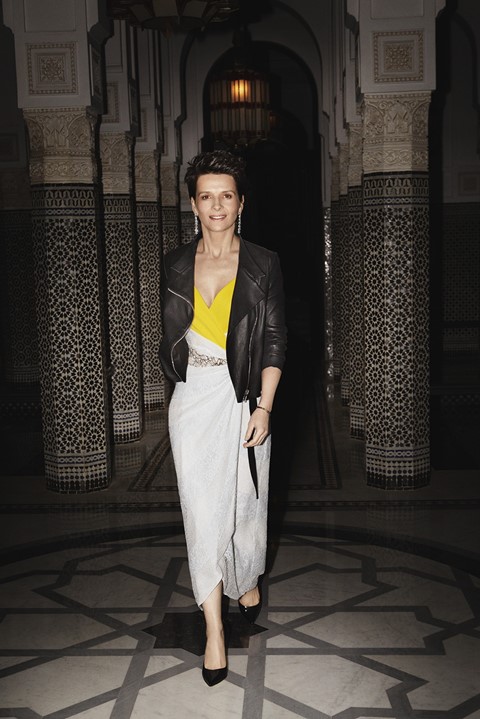Speaking at the International Film Festival of Marrakech, the actress Juliette Binoche considers her ancestral relationship with Morocco
“I heard so many stories growing up about my family in Morocco. My grandfather was buried here, but because of earthquakes you can’t find his grave here anymore. It’s part of life. You can’t be sad about that. You just have to accept and live with it and feel what it brings. He belongs here now, somewhere. So it creates a sort of relationship with the place. I have pictures of my father with his first girlfriend in Morocco, and of the family, so it’s meaningful. I never really spent time here, I’ve been three or four times, but because of all the stories, because of the pictures, I have a relationship with it. There’s so much light. It’s very gloomy in Europe during the winter time, but it’s quite close to France, only three hours’ flight, so it feels like - Ah! All this light and the oranges on the trees – I just love it. Probably because my father is getting older, there’s a feeling of attachment that’s coming to me, knowing that he’s been here. I think it’s related to the knowledge that he is about to leave, so it just plugs things in a different way. He had a sense of feast, or parties, of welcoming, of music and eating together – a kind of celebration of life, a natural celebration of life. At the same time, his mother and father were brought up in a very bourgeois kind of Catholic way. So I think the difference between this kind of very French way of being brought up, and the Moroccan atmosphere, brought out something quite interesting in my father, and he was more Arabic in that sense than French. And I think it influenced me too, in a way.”
"Probably because my father is getting older, there’s a feeling of attachment that’s coming to me, knowing that he’s been here" — Juliette Binoche
Juliette Binoche is speaking in a light-filled, tile-covered room in the legendary La Mamounia Hotel in Marrakech. Its hushed corridors, secluded courtyards and tinkling fountains seem to whisper of its fabled past, one where Winston Churchill would paint views of the Atlas mountains from the balconies and Yves Saint Laurent would come to relax after a gruelling collection. The city has always exerted a pull on artists, but Binoche’s ties to Morocco are stronger than most; her father, the director, actor and sculptor Jean-Marie Binoche, spent much of his youth here.
In Marrakech to receive a tribute as part of this year’s International Film Festival, Binoche was visibly moved by the warm words of her peers. Reflecting on her incredible 30 years as an actress, from her breakthrough role in Jean-Luc Godard’s Hail Mary, to The English Patient and on to her recent mesmerising performance in Bruno Dumont’s Camille Claudel 1915, she says, “I feel like I’m lucky to have met with wonderful directors and have lots of great encounters. I made my choices very carefully, though I made mistakes as well: that’s a part of it, part of life. But I love the present. I’m not a ‘past’ person.” Her career right now is as varied as ever, and she stars in Erik Poppe’s A Thousand Times Good Night as a war photographer, Olivier Assayas’ Sils Maria with Kristen Stewart, and, more unexpectedly, the upcoming Godzilla remake. “Creation is a circle. You don’t know where it’s coming from,” she muses. “That’s why I’m still very, very much in love with my work – because it’s never the same and it’s a challenge each time.”
Text by Laura Allsop
